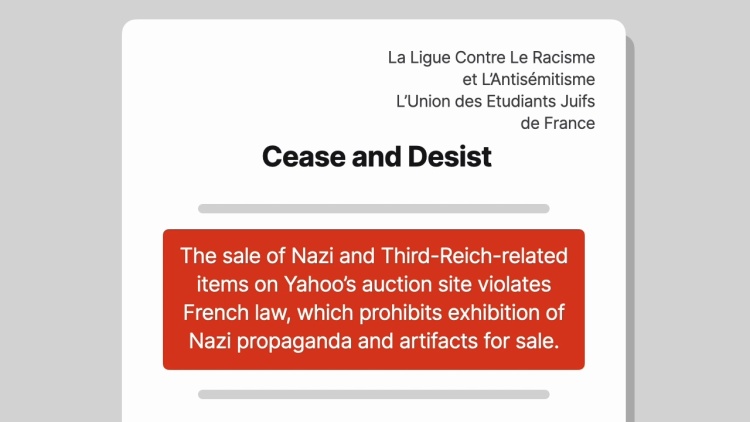Yahoo!, Inc. v. La Ligue Contre Le Racisme et L'Antisemitisme
United States District Court for the Northern District of California
169 F.Supp.2d 1181 (2001)

- Written by Denise McGimsey, JD
Facts
In LICRA et UEJF v. Yahoo! Inc., a French court ordered Yahoo!, Inc. (Yahoo) (plaintiff) to take measures to block French users from accessing content that violated French law. Yahoo had been sued in France by La Ligue Contre Le Racisme et L’Antisemitisme (LICRA) and L’Union des Etudiants Juifs de France (UEJF) (defendants), two organizations whose mission was to fight against the trivialization of Nazism. Yahoo’s alleged violation of French law consisted of allowing Nazi paraphernalia and other materials glorifying Nazism to be auctioned on Yahoo.com. The items were accessible to French users visiting the site. In attempting to comply with the French order, Yahoo found itself technologically unable to prevent French users from accessing the auction site. Thus, it addressed the order by forbidding all users from auctioning items that glorified Nazism. The policy gave discretion to Yahoo in permitting the auction of items of an expressive nature, such as books and media. Notwithstanding the policy, Nazi-related items still found their way onto the site. Yahoo filed a declaratory judgment action in a federal court in California, seeking a declaration that the French order was not enforceable in the United States because Yahoo could not comply with it without excluding the challenged items entirely in violation of the First Amendment.
Rule of Law
Issue
Holding and Reasoning (Fogel, J.)
What to do next…
Here's why 904,000 law students have relied on our case briefs:
- Written by law professors and practitioners, not other law students. 47,100 briefs, keyed to 995 casebooks. Top-notch customer support.
- The right amount of information, includes the facts, issues, rule of law, holding and reasoning, and any concurrences and dissents.
- Access in your classes, works on your mobile and tablet. Massive library of related video lessons and high quality multiple-choice questions.
- Easy to use, uniform format for every case brief. Written in plain English, not in legalese. Our briefs summarize and simplify; they don’t just repeat the court’s language.





